How To Copy Text From Naver Blog
Korea's search engine market share by monthly average users (source: Statista as of March 2021)
FAQ: Is Naver in English?
There are no official English versions of Naver or its properties. The only instances you might see English on Naver are on its account signup page, Korean-English dictionary, and webtoons (i.e., online comics).
Despite this, a workaround is to use your browser to translate pages into English. After doing so, most of the Korean content gets translated, with a few minor exceptions like online shopping ads.
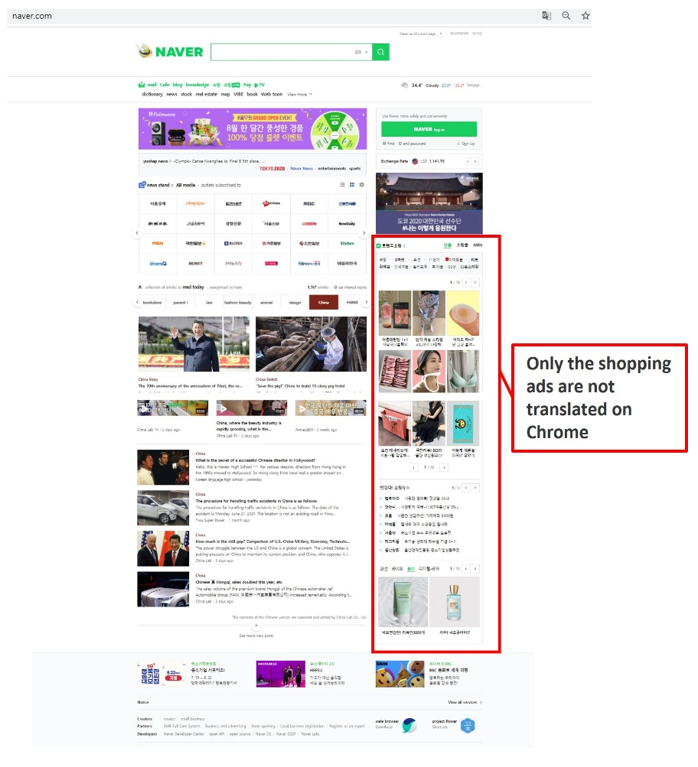
Naver's homepage when Chrome's auto-translate is applied
SERP Layout & Features
At a glance, Naver operates more like a portal or directory than a true search engine, like Google.
While you can search for information on Naver, results are much more localized—like on Yahoo! and MSN—and not comprehensively crawled from every webpage in the world. These sites, in particular, prioritize the latest trending content higher on their homepages.
 Yahoo! and MSN's homepages filled with trending content and platform properties
Yahoo! and MSN's homepages filled with trending content and platform properties
As you can see, search engines like Yahoo! and MSN are busy with trending content and search options from their own platform properties.
With that said, let's dive deeper and uncover how Naver is laid out.
Naver Homepage
Naver's search algorithm is built around the Korean language and delivers more relevant results on a single page, including content from Naver's array of properties like Naver Café, KnowledgeIn, Naver Blog, and Naver Shopping.
Providing such a comprehensive and interactive search experience has made Naver one the world's most engaged platforms, even though it's targeted primarily to Korean speakers, with users averaging more than 27 minutes per visit.
Here, you can see Naver's homepage jampacked with a variety of content types (images, videos, news, etc.), properties, and ad formats.
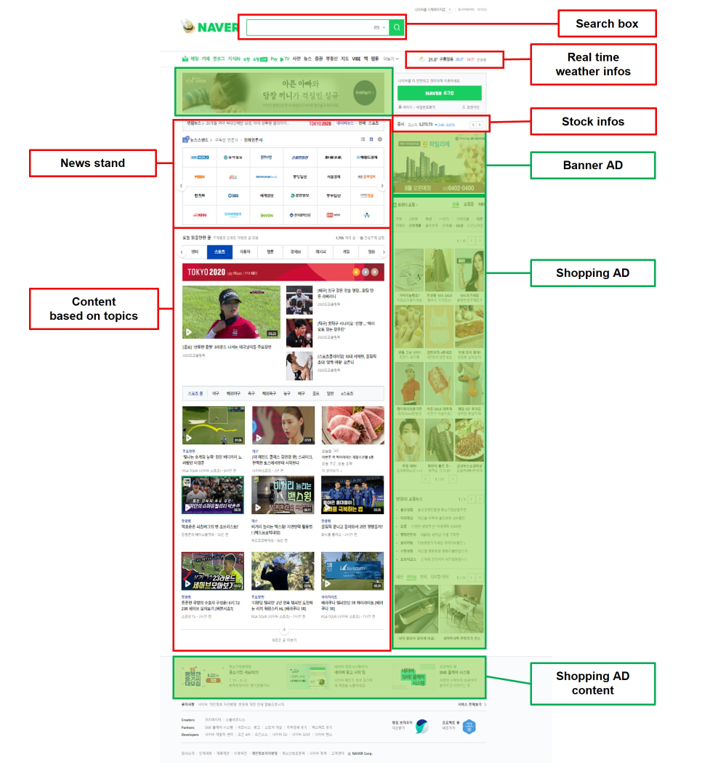
Naver's homepage interface
Naver Search Tools & SERP Layout
On the universal search engine results page (SERP), you'll notice Naver's search tools at the top, a section for related keywords, and another below that section with information relating to your search term.
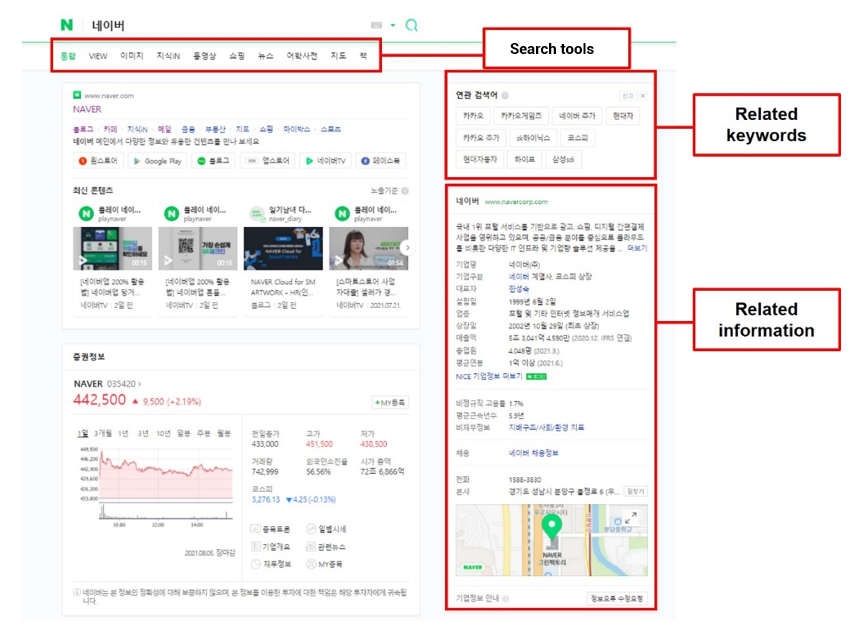
Naver SERP: Search tools, related keywords, and related information
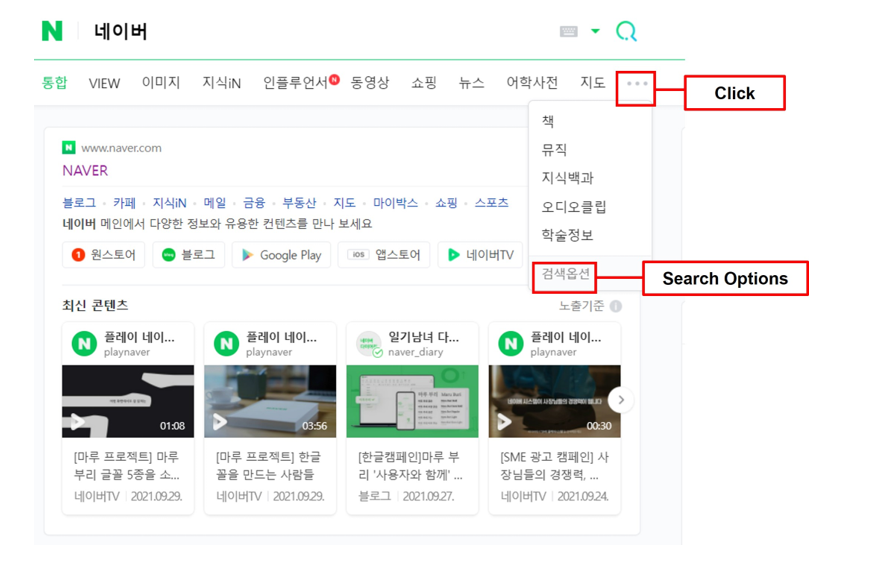
Naver SERP: Additional search options
Clicking the ellipsis icon on the top-right of the interface (under the search box) reveals additional options to filter your search, including:
- Sort results by relevance
- Sort results by date
- Filter results by time range (one hour, one month, one week, one month, three months, six months, one year)
Note: Search options will vary depending on your search category (e.g., view, images, news, etc.).
Naver Vertical Search Categories
 Naver-owned properties
Naver-owned properties
Naver, like Google, offers access to a wide range of information via its vertical search categories located at the top of the SERP. Interestingly, the order in which these appear on both platforms varies depending on the search term and the users' historical search behavior.
But unlike Google, Naver provides more of a blend of images and user-generated content (UGS) across properties like Naver Blog and Café, suggesting it is very much culture and lifestyle-driven—and that Koreans prefer more than just search results.
Note: As of Oct 2020, Naver removed the Website tab from its vertical search options, though you can still find organic results under the universal search tool.
Naver Related/Suggested Searches
There are key differences between related searches on Google and Naver.
- Depending on the keyword, Naver either generates a list of related searches or suggested keywords (or sometimes neither).
- On Naver, related searches are shown as keywords drawn from an analysis of related keywords, content, and the user's search intent.

Naver SERP: Related keywords for the search term "weekly weather"
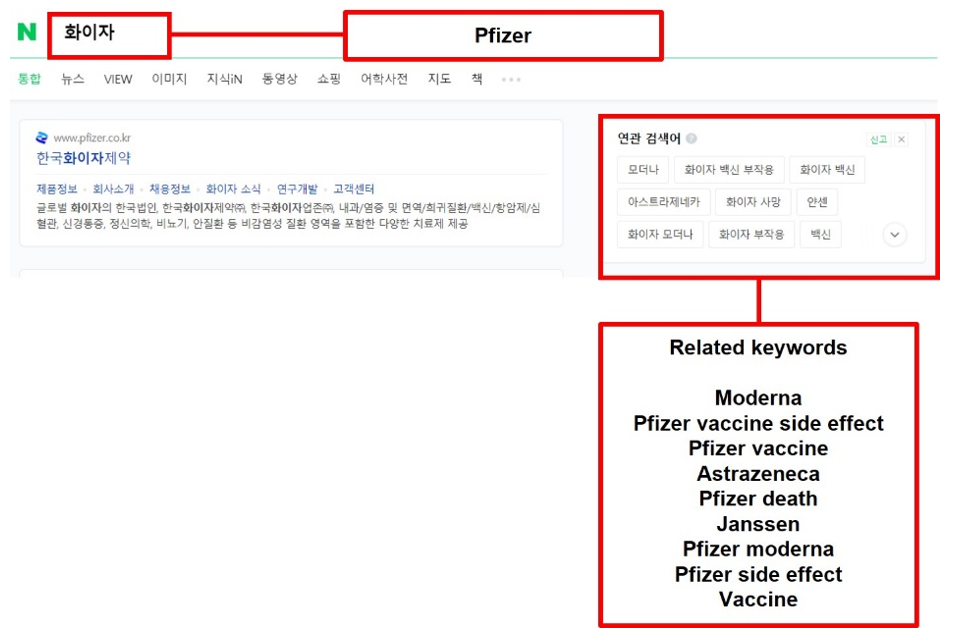 Naver SERP: Related keywords for the search term "Pfizer"
Naver SERP: Related keywords for the search term "Pfizer"
Naver Trending Searches
Naver's trending search feature, which reveals popular keywords in real-time, was discontinued in March 2021 as it became overly used by companies to advertise their promotions.
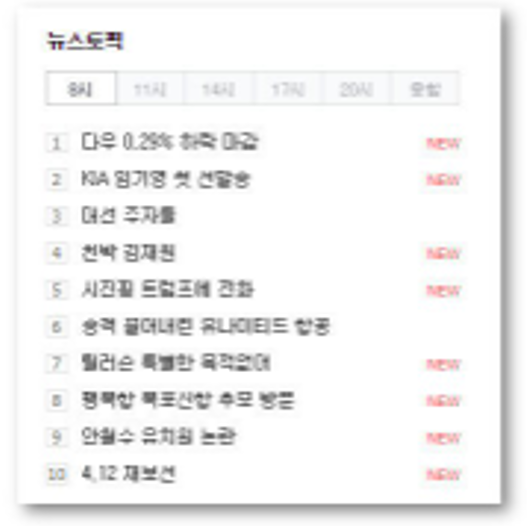
Naver's trending search feature (discontinued in March 2021)
But with the growing demand for new communication interfaces, Naver has instead been developing its other real-time feature, Naver TALK, which lets users chat with each other during live streams.
Naver Universal SERP Features
On Naver's universal SERPs, each page consists of 10 or more different vertical search results.
Try picturing Google's first SERP featuring 30 or more results ranging from images, videos, news, maps, books, scholar texts, and more; That does not even come close to Naver's 19 different vertical categories—and this is without including their featured snippets.
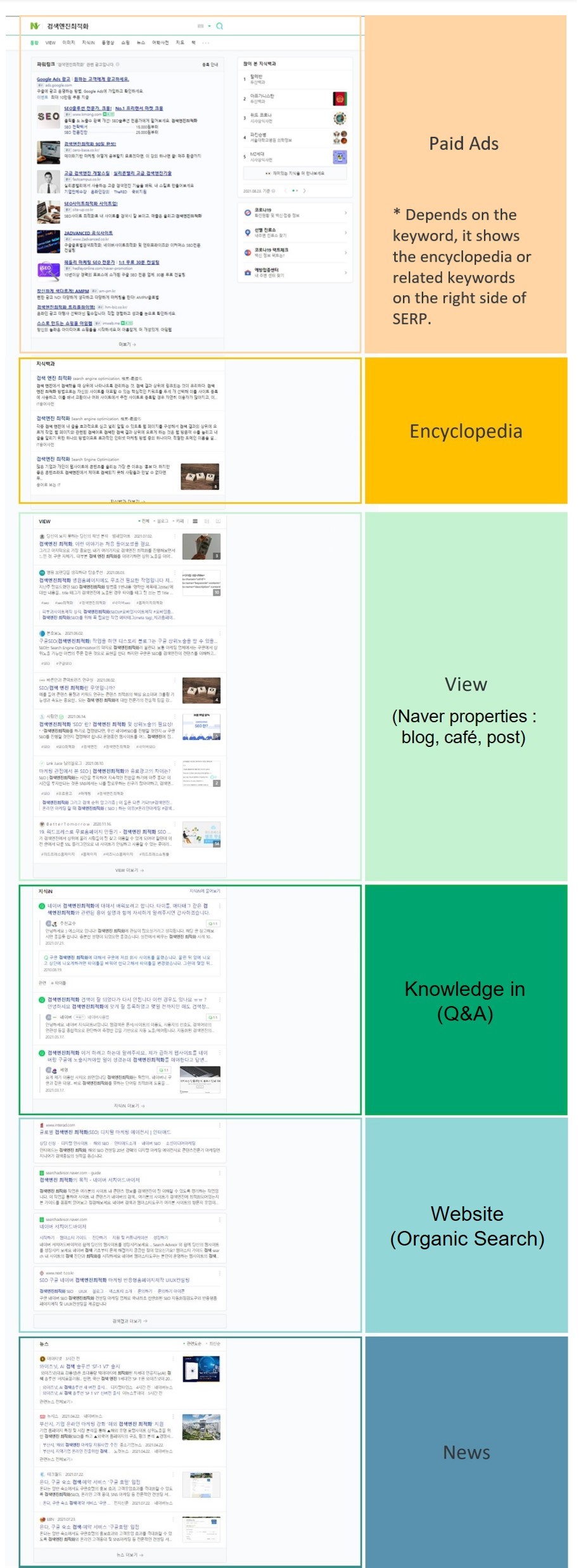
Naver SERP: Vertical categories
With 19 different vertical categories, Naver's SERPs are much longer and busier than Google's, which display no more than 10 organic results per page. This makes diversifying your content portfolio a must to appear across Naver's SERP opportunities.
In terms of SERP rankings, you can also see that Naver favors results from its own properties, even consolidating them under the View section (in light green above) to increase Naver-owned exposure.
Naver Paid Search Ads
There are various types of ad formats and specifications on Naver, which you can learn more about from our website.
It is, however, worth noting that ads can occupy a large real estate on Naver's SERPs, so you should familiarize yourself with the different ad formats available for the keywords you are trying to rank for.
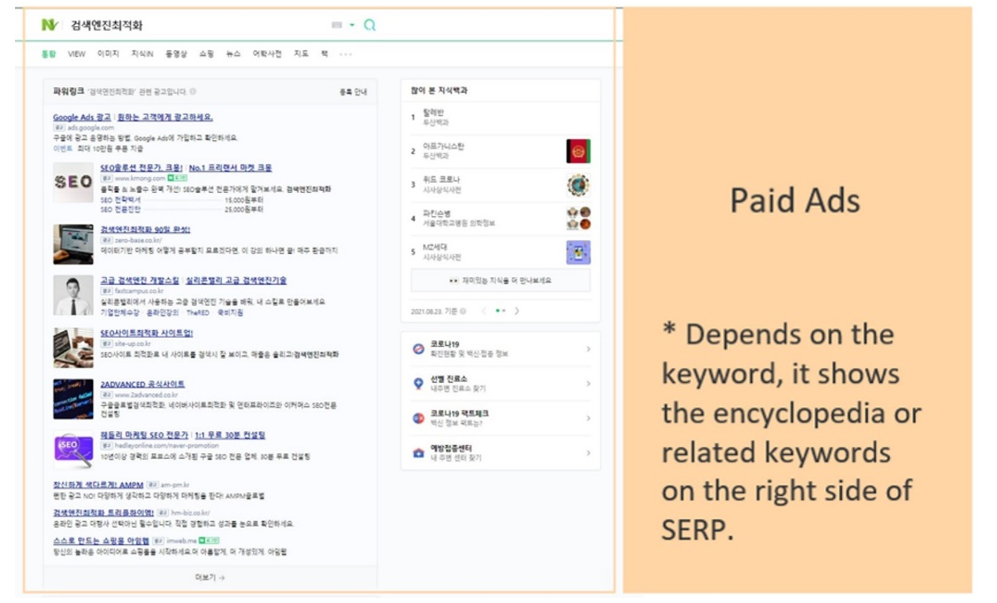
Naver SERP: Paid ads
Naver View Section
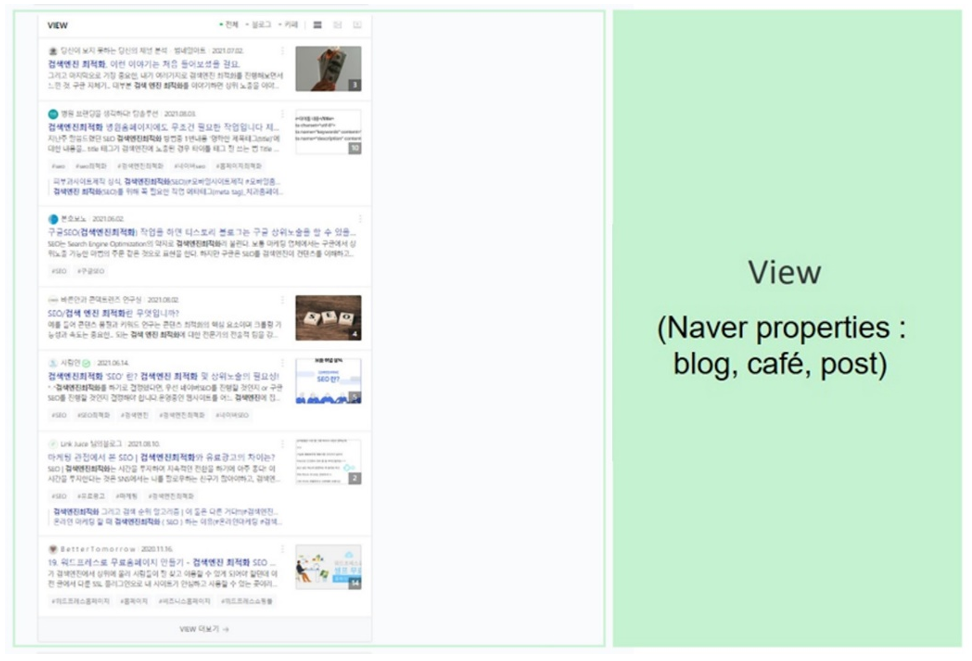 Naver SERP: View search section
Naver SERP: View search section
Naver's View search section—which is powered by Naver's C-Rank and D.I.A+ algorithms—displays integrated content from Naver Blog, Café, and Post. Using signals generated by Naver's properties, these algorithms help establish the authority, popularity, and reliability of UGC versus website-produced content.
And although the View section compiles results from different properties, the algorithms are uniquely adapted to serve the right content to the right audiences.
Naver Post, for instance, delivers content aimed primarily at working professionals, so the algorithm reflects this by serving up pages with higher credibility scores.
Naver Websites
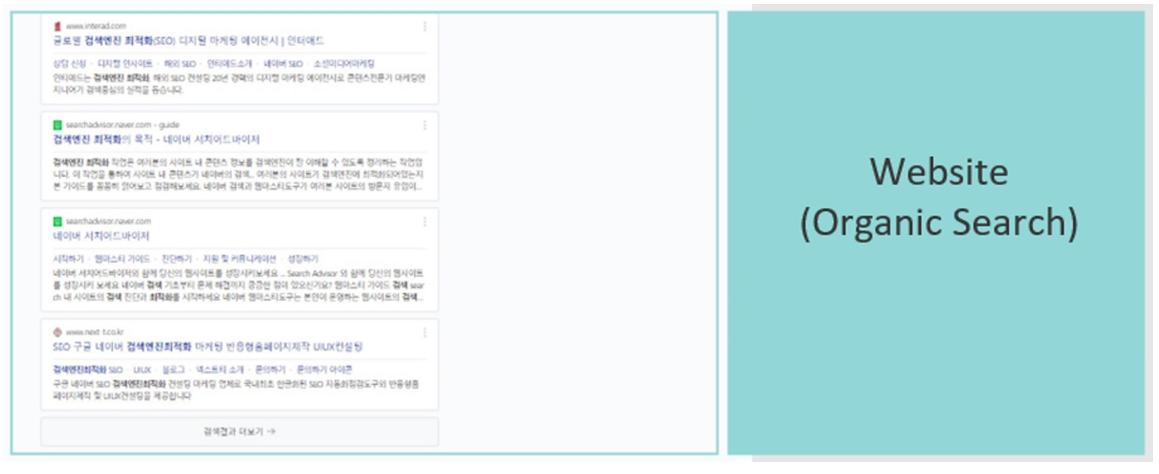 Naver SERP: Organic results section
Naver SERP: Organic results section
Naver removed its website search function in October 2020, but organic results—from all Naver-owned properties—are now found under the universal search section on the first SERP.
In 2021, Naver announced an algorithm update based on the SOLID project, which promises a better matching of search intent and understanding of textual nuances in titles and meta descriptions.
By considering more ranking signals, the SOLID project has made Naver's results more relevant and better trusted.
Naver Encyclopedia
 Naver SERP: Encyclopedia results section
Naver SERP: Encyclopedia results section
This vertical search section displays results from Naver's own encyclopedia platform, as well as from Wikipedia.
KnowledgeIn
KnowledgeIn (지식iN)—Naver's Q&A platform akin to Yahoo! Answers—continues to be highly popular among Korean users, who can post questions for other users to answer or raise discussions across a multitude of topics. Answers can also be up- or down-voted by other users.
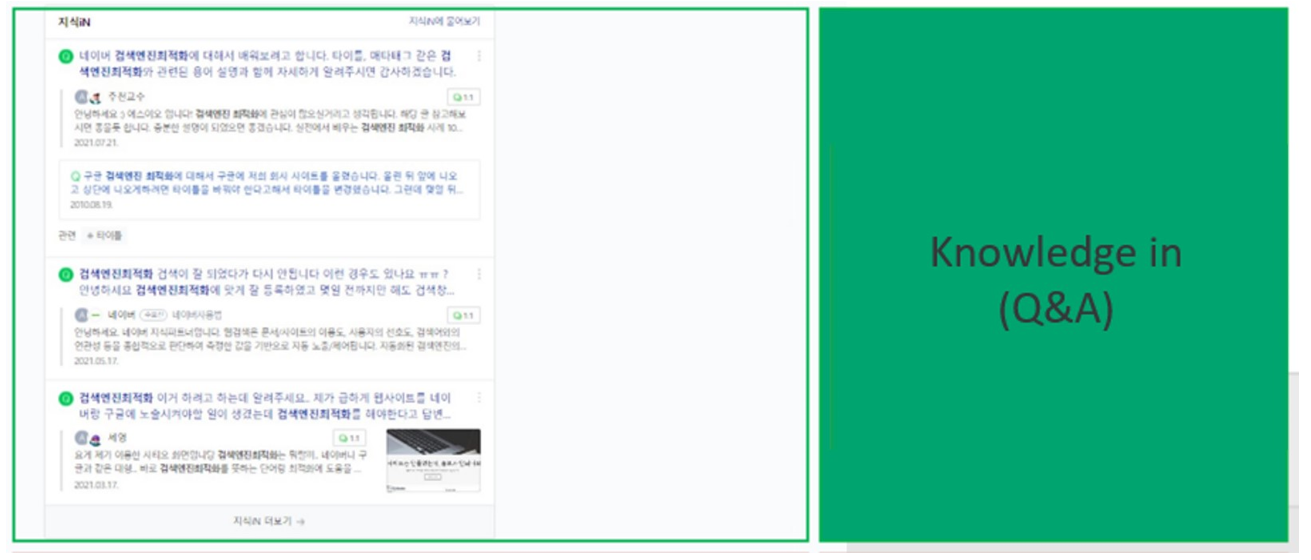 Naver SERP: KnowledgeIn section
Naver SERP: KnowledgeIn section
Naver Algorithms & Ranking Factors
Ranking Algorithm for View Search
In May 2021, Naver applied its robust new ranking algorithm to View search to deliver relevant and higher quality pages to users on its SERP. With more frequent indexation, it can better reflect user search intent and lay the groundwork for applying new ranking features quickly.
This is particularly important given the continuous updates to C-Rank and D.I.A+, two algorithms first applied to Naver VIEW back in 2016 and 2017.
The ranking update includes:
- Providing well-indexed pages that reflect user search intent
- Offering meta title/tags to index well-structured websites
Naver Technical SEO: Basics
Robots.txt
Although not as comprehensive as Google's Search Console, Naver Search Advisor (previously Naver Webmaster Tools) is handy for submitting manual requests whenever you need the bot's attention.
Among its functions, one of the most useful lets you create robots.txt files—albeit at a rudimentary level—and have them checked once updated.
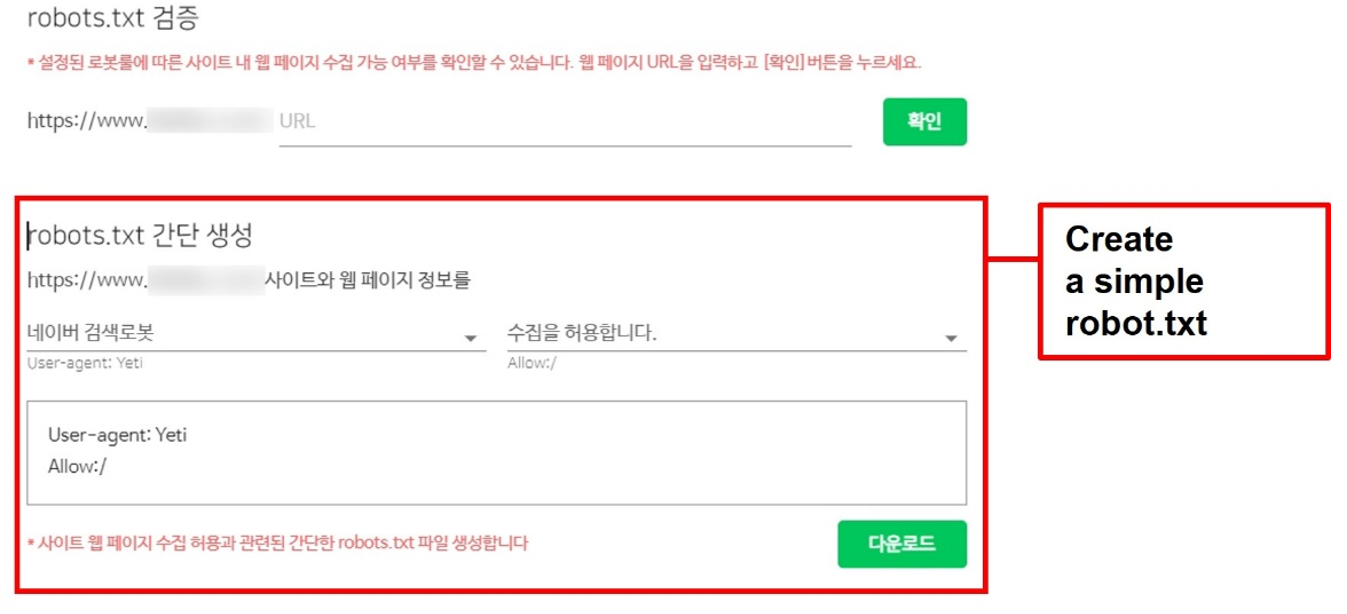 Naver Search Advisor: Creating a robot.txt file
Naver Search Advisor: Creating a robot.txt file
Naver Sitemaps
Due to the limitations of Yeti, the name of Naver's search robot, the use of sitemaps might be even more crucial on Naver than on Google.
Note that Naver Search Advisor currently only reads XML sitemaps and supports optional tags <changefreq>, <priority>, and <lastmod>.
Once you have created it, submit your sitemap to Naver Webmaster Tools to help Naver crawl your site. Only one sitemap can be submitted per site.
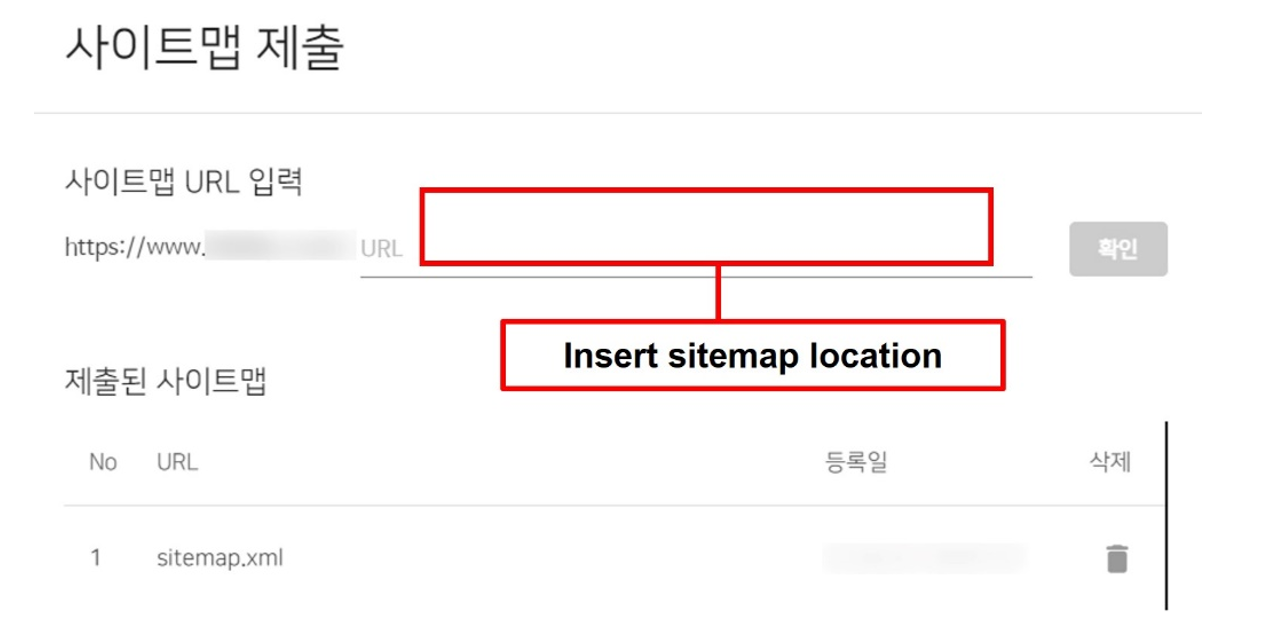 Naver Search Advisor: Submit sitemaps
Naver Search Advisor: Submit sitemaps
Monitor Your Indexation on Naver
There are two ways to check your site's indexation on Naver.
- Naver Search Advisor: It can monitor your site's crawlability and indexability over the past 3 months.
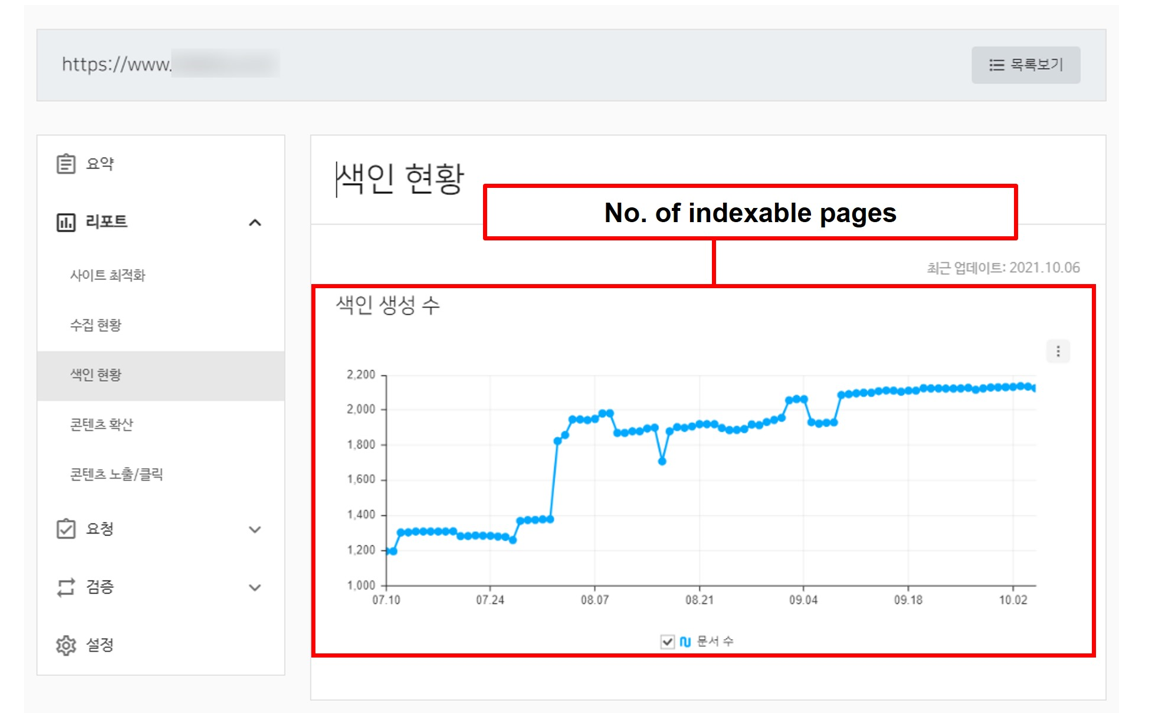 Naver Search Advisor: Number of indexable pages in the past 3 months
Naver Search Advisor: Number of indexable pages in the past 3 months
- Naver site search operator: Use this to index data on Naver and find indexable pages on the universal SERP.
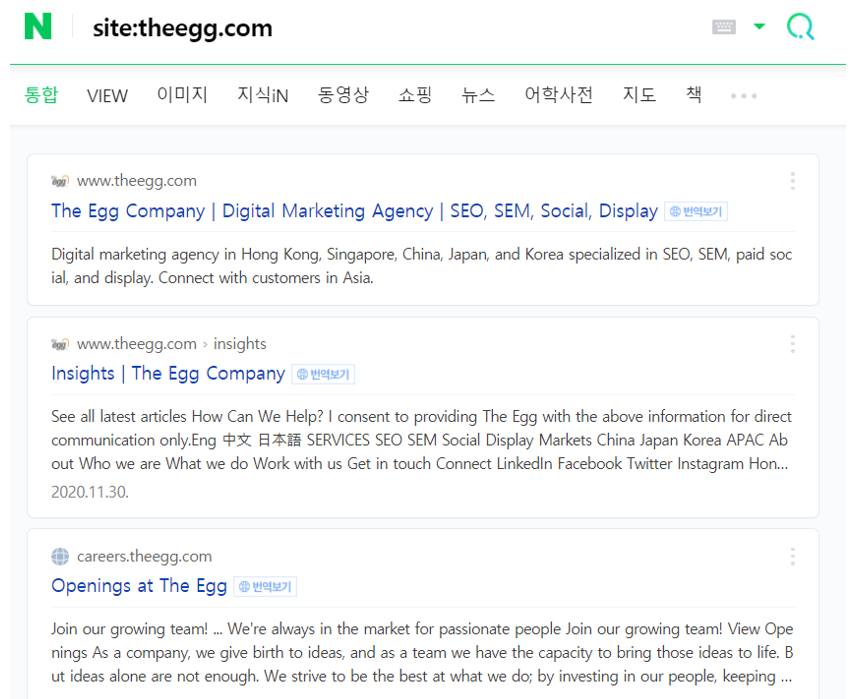
Naver site search operator: Identifying indexable pages
Naver Open Graph Tags
Within these tags is information that will show up when pages are shared on social media.
 Naver open graph tags
Naver open graph tags
To emphasize how crucial tagging is for your social pages, South Korea ranked second (89.3%) in the world for active social network penetration as of January 2021.
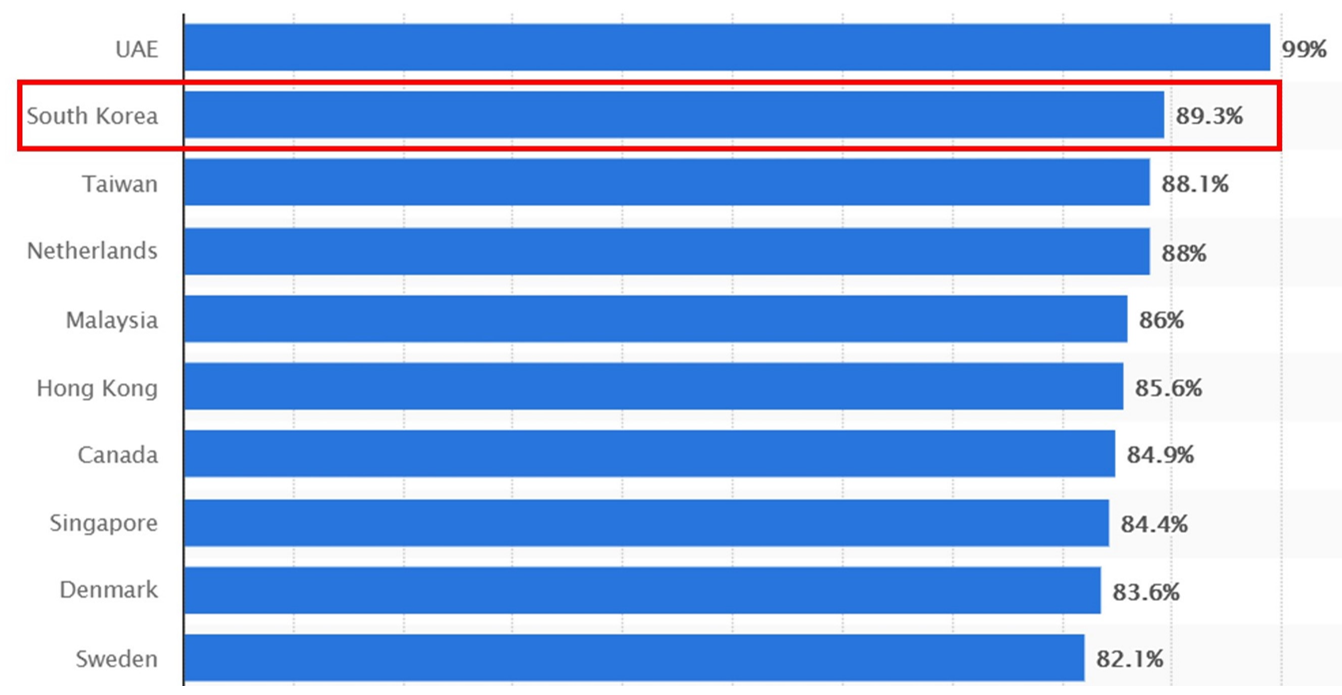 Active social network penetration in countries and territories as of January 2021 (Source: Statista)
Active social network penetration in countries and territories as of January 2021 (Source: Statista)
Naver Backlinks
You can monitor your backlink profile on Naver Search Advisor.
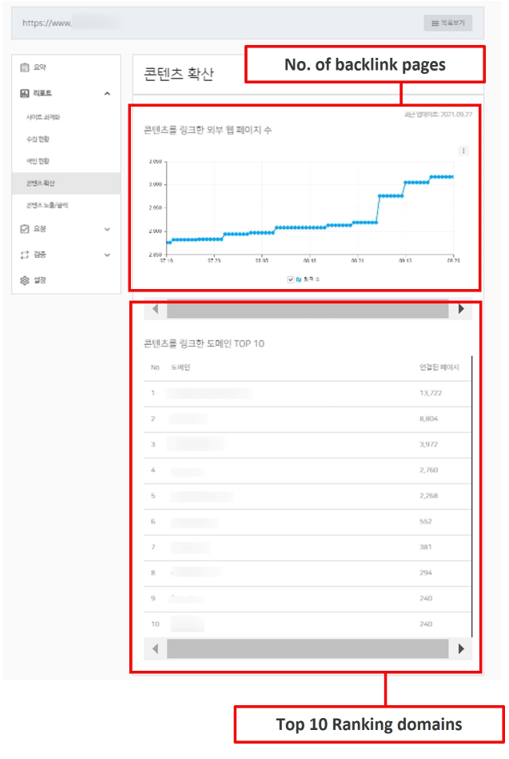
Naver Search Advisor: Backlink data
On- & Off-Page Optimization
Social Media
With regards to social, Naver Search Advisor currently only shows what social networks its crawler has found to be connected to your website.
But by using schema markup, you can send explicit signals to Naver from any of your social media channels, which can include Naver Blog, Naver Café, Naver Post, StoreFarm (Naver's e-commerce), Brandstore, Naver TV, Facebook, Instagram, iTunes, Google Play Store, LinkedIn, Kakao Story, and more.
At the same time, you can disconnect any of them through Naver Search Advisor.
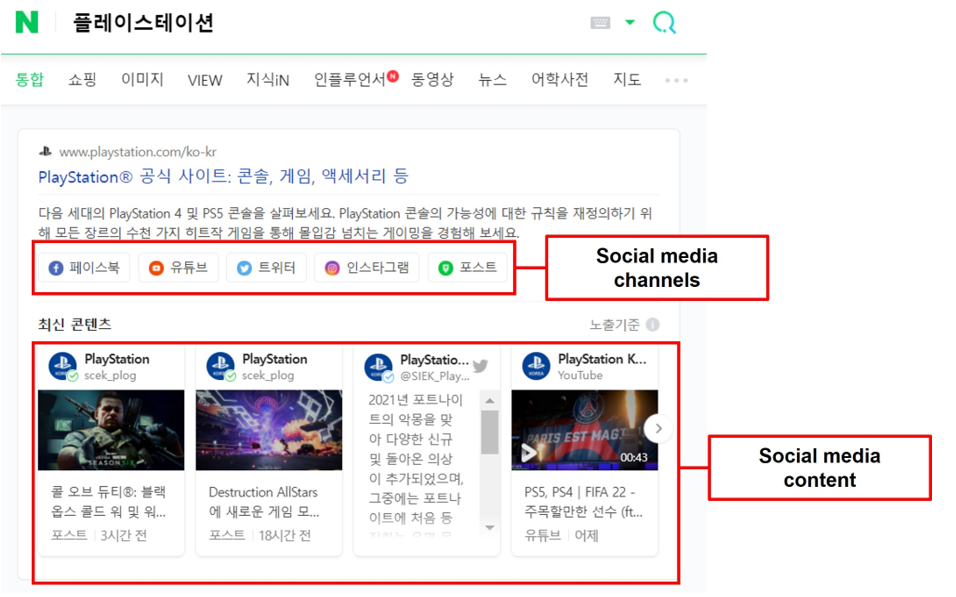
Naver Search Advisor: Overview of social channels linked to your site
Naver Blog Optimization
C-Rank Algorithm Applied on Naver Blog Search
C-Rank measures the authority and quality of blogs while D.I.A+ analyzes the search term to better understand user intent and optimize Naver's SERP. As such, blogs written by authors with expertise in a specific topic would theoretically rank higher on Naver's SERP.
Furthermore, Naver's D.I.A+ algorithm crawls each blogs' feature image and displays it as a snippet on the result to improve the look and feel of its SERP.
Here's a look at Naver's top-ranking blog results for certain search terms.

Naver SERP: Top-ranking blog results for search terms "monthly living cost" (left) and "movie recommendations" (right)
Naver Blog Category Selection
Since C-Rank prioritizes results based on how well they match a search term, it is far more likely for a blog specializing in a specific topic to rank higher on Naver's SERP versus one without a theme.
And while C-Rank is capable of detecting a blog's theme through deep learning AI, Naver recommends manually selecting your blog categories each time to improve the algorithm's accuracy. We also recommend using manual settings wherever possible instead of depending your rankings solely on Naver's algorithms.
To date, there are 32 topics under four main categories that bloggers can choose from:
How To Copy Text From Naver Blog
Source: https://www.theegg.com/seo/korea/naver-seo-guide-understanding-the-korean-search-engine/
Posted by: marquardtaccur1984.blogspot.com

0 Response to "How To Copy Text From Naver Blog"
Post a Comment